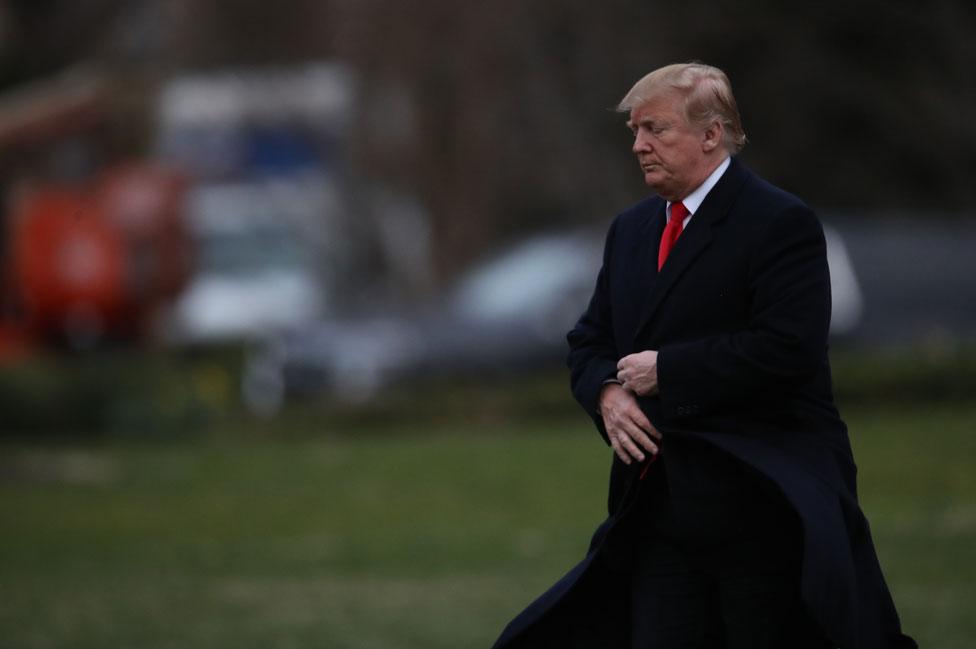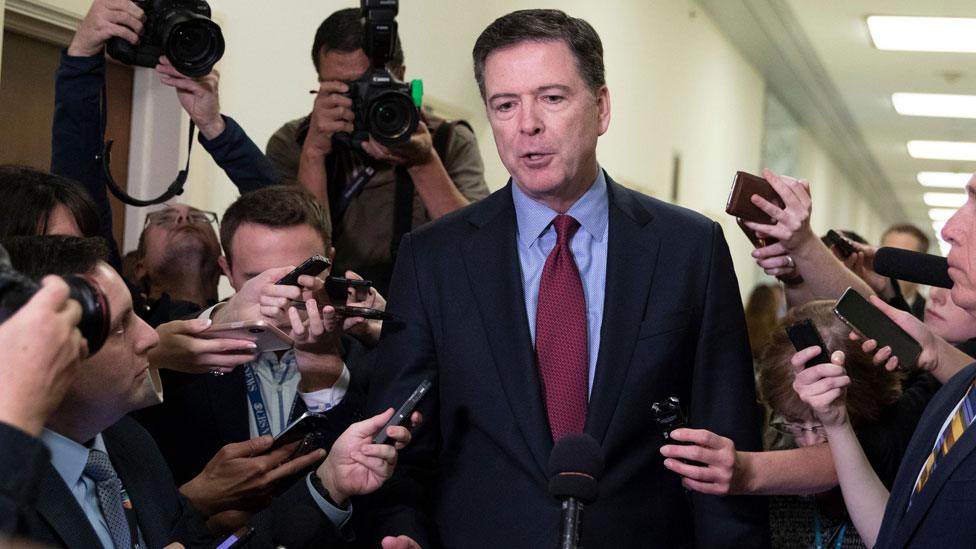Viewpoint: Mueller called it (largely) right on Trump
- Published

Jubilation, anger and simple relief it's finally here - Americans responded to the partial release of the special counsel's report in a number of ways. But what about the legal issues raised? Jonathan Turley, professor of constitutional law at George Washington University, gives his view.
For millions of Americans, Robert Mueller's headline findings have hit hard.
Even after two years of preparation, many Americans were not prepared to hear that President Donald Trump would not only complete his term in office but might not even be charged with a single crime in the Russian investigation.
Mr Mueller himself seemed to sense the shock that would come with his findings.
After finding categorically that no crime of collusion occurred, he hedged on the question of obstruction by saying that while he did not conclude the president committed a crime, he also did "not exonerate him."
Mr Mueller seemed to be following an old joke about a man who calls his brother who has been house sitting during a long trip. The brother immediately says "Fluffy is dead."
The man yells at his brother that this is not how you tell someone their cat is dead - rather you build it up by first saying the cat is "stuck on the roof and then call back to say she fell".
After the brother apologised, the man asked how their mom is doing, and the brother paused and replied: "Mom's stuck on the roof..."
The slight roundabout way of clearing President Trump had about the same effect - it was little comfort.
People had invested Mr Mueller with their hopes for a premature termination of the Trump administration.
After Attorney General William Barr concluded that Mr Trump had not committed criminal obstruction, the inescapable fact was that he is likely to finish his term of office. There, I said it.
In reality, we never really needed the "roof" build-up.
1. Collusion
Let's start with collusion. For two years, I have written that the theories of collusion crimes were factually and legally flawed. Nevertheless, people tuned into channels like CNN and MSNBC where they heard legal experts assure them that collusion was clear and criminal charges imminent.
This echo-chamber viewing actually convinced millions that Trump would be frog-walked to a federal penitentiary with his Russian handlers. It was all part of the collusion delusion.
The grand collusion conspiracy was never particularly convincing. It would have Trump or his family or aides helping to hack computer systems and then arrange for the leaking of the information through WikiLeaks.
Mueller report: One summary, two interpretations
There was never any explanation on why Russian intelligence would take such a risk and place itself at the mercy of a serial social media user. Then there is the implausible meeting of this secret cell in Trump Tower with half of the world's media downstairs.
The Russians in the meeting did not even know who would attend. It lasted roughly 15 minutes and focused virtually entirely on the ban on Russian adoptions (an issue that the Russian lawyer had long lobbied against). While evidence of criminal wrongdoing by Hillary Clinton was promised, nothing was disclosed.
Then there was the interest in Trump and people like Roger Stone in obtaining the WikiLeaks emails. The question is why such efforts were necessary for co-conspirators. Virtually every reporter and political operative in Washington was trying to get access to the same material.
Yet legal experts still proclaimed that crimes from collusion to conspiracy to treason were already established. None of that changed as Mueller filed numerous indictments and memorandums with courts that conspicuously omitted any evidence supporting collusion.
Collusion was the crime of hope over experience and a wide array of pundits and politicians kept hope alive until Mueller dispatched the theory in his report in roughly two dozen words: "[T]he investigation did not establish that members of the Trump campaign conspired or coordinated with the Russian government in its election interference activities."
2. Obstruction
Obstruction was always a closer question. Some of us opposed the appointment of a special counsel before Mr Trump fired FBI Director James Comey.
When he took that self-defeating step, the situation changed - many of us called for a special counsel because now there was a possible crime of obstruction. It did not make it a strong claim and I questioned its viability, but it deserved to be investigated.
The problem was that Mr Trump never fired Mr Mueller. He was never accused of destroying evidence. He never forced the investigation to a premature end.
To be sure, he acted in a highly inappropriate and objectionable way. Indeed, he almost counterpunched his way into an obstruction case. Yet, despite his best efforts, he failed.
Obstruction is based on a state of mind. When Mr Mueller found that there was no evidence of collusion, it undermined such an obstruction case.
It could still occur but Mr Trump needed to intend to obstruct the investigation. The problem is that Mr Trump's irresponsible and self-defeating tweets on the investigation were consistent with such statements in a myriad of other areas from immigration to North Korea. He maintained that the investigation was not only based on a false allegation but the result of a Deep State conspiracy.
Indeed, a federal appellate court in February just reaffirmed what many of us (including Barr himself) have been trying to point out - obstruction crimes are narrowly construed by the courts to establish a close "nexus" between the alleged misconduct and an official proceeding.
The Fourth Circuit was the latest court to throw out a conviction on that basis in United States v Young last month. Notably, the court cited the case of Arthur Anderson v United States, which two of Mr Mueller's top aides lost before the Supreme Court by overextending such language.
The fact that Mr Trump refused to be interviewed on obstruction was not likely determinative. Most targets do not give testimony before a grand jury and prosecutors base their decision on the rest of the record.
If Mr Trump's testimony was determinative, Mr Mueller could have sought to force it or he could have stated that the absence of the testimony was the reason why he could not reach a final decision.
However, all the president had to do is continue to repeat that he fired Mr Comey because of his poor record and attacked the investigation because it was launched in the absence of a crime (which Mr Mueller himself confirmed could not be established).

The firing of James Comey was scrutinised by Mueller
Ultimately, Mr Mueller punted on the ultimate question. Mr Barr explained that Mr Mueller did "not conclude that the president committed a crime, it also does not exonerate him." However, both the attorney general and his deputy took just two days to say the obvious - there was no obstruction case to be made. In other words, the obstruction indictment was stuck on the roof.
In the end, everyone but the public came out ahead.
The president was not charged and used the investigation to rally his base. The Democrats used the investigation to help retake the House of Representatives. The media enjoyed massive ratings in pushing the collusion allegations.
Everyone had windfall benefits except the public, which was left feeling like chumps or victims or both.
Yes, Mr Trump will finish his term. But the distemper - and the investigations - will continue up to the 2020 elections.
Jonathan Turley is the Shapiro Professor of Public Interest Law at George Washington University and served as the last lead defence counsel in an impeachment in the US Senate